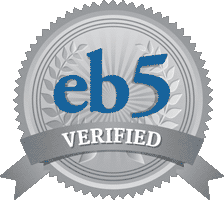| Who may obtain an EB-5 visa? |
Any person who can demonstrate the ability to invest the required amount into the American economy, can document that the capital was legally earned, and satisfies general eligibility requirements (e.g., medical, criminal) is qualified to apply. The investor's spouse and any minor children (under 21) also qualify. The age of the minor children is "frozen" at the time of the I-526 application so, for example, a 20-year old dependent is not in danger of "aging out" during the process.
|
| What is the minimum investment required? |
An investment of at least $1,000,000.00 is required for an EB-5 visa. If however, the investment is made in an area that has been designated a Targeted Employment Area (TEA), the investment is a minimum of $500,000.00.
|
| Will my investment in a Regional Center be returned if my application is denied by the U.S. Citizenship and Immigration Services (USCIS)? |
Yes. The PCFG Regional Center has created an escrow account in which your investment is held until your application is approved by the USCIS. In the event that your I-526 application is denied, your investment will be returned to you in full minus administrative expenses.
|
| For how long is the "green card" valid? |
The investor and dependents receive a conditional, 2-year green card. Before the expiration of the two year period, a petition is submitted to the USCIS confirming that the investment has been made and that ten direct and/or indirect jobs have been created as a result of the investment. In a non-regional center investment, job creation is limited to direct jobs only.
|
| If I or a member of my family is already in the U.S. on another visa, is it necessary to return to my home country in order to obtain an EB-5 visa or permanent residence? |
Probably not. In order to obtain permanent residence in the U.S. under the EB-5 program, you may not need to return to the country of your citizenship. You and the members of your family may apply to adjust status while in the United States if you are in valid, non-immigrant status.
|
| How long does the application process take? |
In general, the process takes less than one year. After the I-526 petition is approved, it is forwarded to the overseas consulate or local USCIS for further processing and final visa issuance and conditional residency approval.
|
| Where can I find more information about the EB-5 visa program? |
Further information regarding the application process, requirements, and benefits of the EB-5 visa program can be found on the website of the U.S. Citizenship and Immigration Services (www.uscis.gov).
|
| Is it required that I have a degree of higher education? |
No. There are no education requirements for EB-5 visa applicants.
|
| Must I have previous business experience? |
No, it is not required that an applicant have had any previous business experience.
|
| What if I do not speak English? |
It is not required that an applicant speak English.
|
| Is it required to show that I am in good health? |
Yes. You must prove that you and any accompanying family members are in good physical and mental health, and do not have any diseases or disorders that may present a threat to society.
|
| Do I need to have earned the money for the investment myself? |
No. For example, the money can be a gift. The only requirement would be to show that the gifted money was legally earned, and that taxes (if applicable) were paid on the gift. Another example would be using the proceeds of the sale of real estate or a prior investment to fund the investment.
|
| May I apply for an EB-5 visa if I have previously been denied a visa to the U.S.? |
If you have been previously denied a visa to the U.S., you may still apply for an EB-5 visa.
|
| Can qualified individuals from any country apply or are there restrictions based on citizenship? |
With the exception of individuals from countries with which the U.S. does not hold diplomatic relations, citizens of any country may apply for permanent residence in the U.S. through the EB-5 investment program. As long as the applicant is able to leave his or her home country and has sufficient investment capital, a qualified immigration lawyer can assist the applicant with the process of obtaining an EB-5 visa.
|
| What is the most common reason for rejection of an EB-5 visa application? |
In most cases when an EB-5 visa application is rejected, the applicant failed to demonstrate that he or she had legally earned his investment capital.
|
| What other requirements are there in order to obtain an EB-5 visa? |
To obtain an EB-5 visa, as with any other visa to the U.S., the applicant and any accompanying family members must meet all requirements
(e.g., criminal, medical) stipulated by the immigration laws of the
United States.
|
| What are Regional Centers? |
Regional Centers are entities, organizations, or agencies that focus on a specific geographic area within the United States in order to promote economic growth within that area. Regional Centers work to increase export sales, improve regional productivity, create new jobs, and increase domestic capital investment. Regional Centers are designated by the U.S. Citizenship and Immigration Services.
The Palm Coast Florida Group Regional Center comprises six counties those being St. Johns, Flagler, Volusia, Orange, Seminole and Brevard, in the State of Florida.
|
| What are the financial risks involved with the Regional Center investment projects? |
All investments are risky by nature and the Regional Center projects are not exceptions. Under the law, the Regional Center cannot guarantee profit or the return of the principal investment.
|
